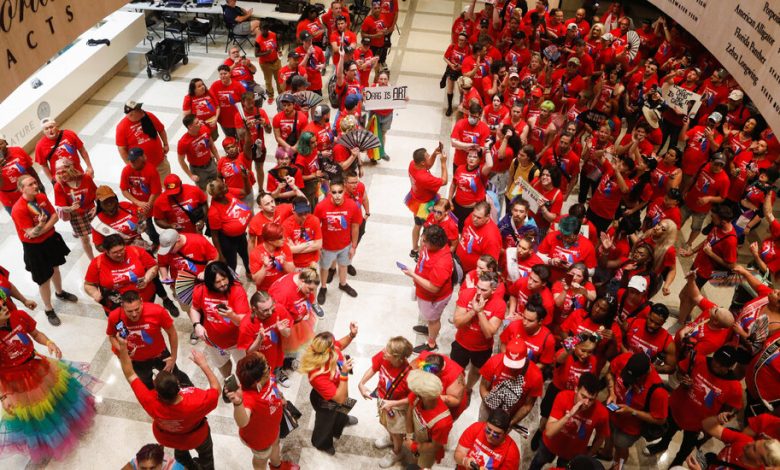Supreme Court Refuses to Revive Florida Law Restricting Drag Shows

The Supreme Court refused on Thursday to revive a Florida law that banned children from “adult live performances” such as drag shows.
The court’s brief order gave no reasons, which is typical when the justices act on emergency applications, and a First Amendment challenge to the law will continue in the lower courts.
Justices Clarence Thomas, Samuel A. Alito Jr. and Neil M. Gorsuch dissented. Justice Brett M. Kavanaugh, joined by Justice Amy Coney Barrett, issued a statement stressing that the court’s order was addressed to an issue unrelated to the constitutionality of the law.
The order, he wrote, “indicates nothing about our view on whether Florida’s new law violates the First Amendment.”
Florida’s Republican-controlled Legislature passed the measure in April, and Gov. Ron DeSantis, a Republican who is running for president and has made conservative culture-war issues central to his agenda, signed it into law in May.
The law bars “lewd conduct” that “taken as a whole, is without serious literary, artistic, political or scientific value for the age of the child.” The state can impose fines and suspend or revoke operating and liquor licenses of businesses that knowingly admit children to such performances.
Hamburger Mary’s, an Orlando restaurant that features drag shows, including “family friendly” ones, filed a lawsuit challenging the law, saying it violated the First Amendment. The suit said the law did not define terms like “lewd” and “child,” leaving the restaurant to guess which performances and which audience members were covered.
Judge Gregory A. Presnell of the Federal District Court in Orlando ruled for the restaurant, issuing a preliminary injunction blocking the law throughout the state, saying it was vague and overbroad.
“This statute is specifically designed to suppress the speech of drag queen performers,” the judge wrote.
He added that Florida law permits any minor to attend R-rated movies if accompanied by a parent or guardian and that “such R-rated films routinely convey content at least as objectionable as that covered” by the law.
After a federal appeals court turned down the state’s request to put the ruling on hold while it considers the case, state officials asked the Supreme Court to step in.
The officials said they would have no objection to the injunction were it limited to Hamburger Mary’s. But they said Judge Presnell should not have blocked the law throughout the state.
The question of how broadly injunctions should sweep has been the subject of controversy for years, and lawyers and scholars have questioned whether and when so-called nationwide or universal injunctions are appropriate. Some justices have indicated that the court should address the question in an appropriate case.
But the one involving the Florida law has a distinctive feature that makes it unrepresentative of the general problem. Judge Presnell’s injunction rested on a doctrine peculiar to First Amendment cases, one that allows judges to strike down overbroad laws because of their chilling effect on others’ speech.
In his statement on Thursday, Justice Kavanaugh wrote that “the question of whether a district court, after holding that a law violates the Constitution, may nonetheless enjoin the government from enforcing that law against nonparties to the litigation is an important question that could warrant our review in the future.”
But, he added, the case on the Florida law was an “imperfect vehicle.”
“The issue arises here in the context of a First Amendment overbreadth challenge, which presents its own doctrinal complexities about the scope of relief,” he wrote. “This case is therefore an imperfect vehicle for considering the general question of whether a district court may enjoin a government from enforcing a law against nonparties to the litigation.”




